- Home
- Tony Roberts
The Commissar Page 9
The Commissar Read online
Page 9
What he did learn, though, was some interesting gossip. He plied her with tales of fighting and the struggle in the Ukraine, embellishing it with fictional accounts of bravery and gallantry which she was suitably impressed and absorbed with, and in return she told him of the supply situation. She’d learned that from the committee man, clearly. There were also other things she knew and he nodded as if he was privy to them already, which he clearly wasn’t.
The Soviet forces were building up, recruits were being rushed to the fronts and units were either being enlarged or new ones created. Of course, this resulted in supply issues of their own so the committees in the various cities were working hard to feed and keep the forces stocked with munitions.
Comrade Trotsky was in charge of this in Moscow and was constantly on the telephone to his regional subordinates to ensure each army unit was trained, equipped and had a clear idea of what was expected of them. Casca soon learned that the new Russian rulers were keeping the old term for army groups, ‘Fronts’, and that the army units in Voronezh were being considered for action further east where the situation was becoming a concern to the hierarchy.
So much gossip learned by these women, and it was clear that if you wanted to plant a spy, then here was the perfect place for it. Casca wondered whether this big-breasted woman was one, but then thought, ah the hell with it, let’s just enjoy her.
Later as Casca and Nakarov wandered back from the house, Nakarov expanded on the subject of moving east. “Sure, that’s likely. We don’t have any further worries from the west anymore, since the Ukraine has got what they want, independence and with the Germans backing them, their soil free from our forces. The north is Petrograd’s business, not ours and they’ve got the best troops up there keeping the Finns, Baltics and Germans there in check.”
He pointed into the darkness. “No, it’s the east we’ve got to be more worried about. There’s all kinds of problems what with the Cossacks, Deniken’s Whites and this blasted Czech Legion. I don’t know yet what forces will be sent east but I’m certain a lot of us will be, and what you’ll have left here are just a screen to watch the west.”
Nakarov’s words proved prophetic, for six days later he and much of his men were sent to Saratov. For Casca, though, he was not part of the move. His role was to remain in Voronezh and help build up the fighting ability of the common soldiery there. His skills had been noted, particularly by Kirilov who was now a Colonel. Kirilov wanted men around him who were reliable and this Commissar Kaskarov seemed the right type to be a drill instructor.
For Casca it wasn’t too bad; he got to see the big-titted whore on more than one occasion, and only the presence of the Cheka agents and their boss, Astapenko, spoiled what would have been otherwise a perfect stay.
While he was there in the summer, news came that the Tsar and his family had been shot in Ekaterinburg, because the Czechs were closing in on the city. It seemed things were going from bad to worse for the Reds; the south had been lost to Deniken, the east was slowly succumbing to the People’s Army of KOMUCH, a social revolutionary movement dedicated to wiping out the Bolsheviks, and Siberia had declared itself independent and was now under the command of the former Admiral Kolchak.
Then, as autumn came, new orders were sent and passed around the commanders and commissars. They were to be sent to Kursk to help form the new forces set up to return the Ukraine to Soviet rule. The fading German power was one big factor, and it was clear that the Central Powers were slipping to inevitable defeat, and when it came the Bolsheviks would resume the war in the west.
Casca was to be part of the new Ukrainian Soviet Army.
CHAPTER TEN
It had taken time to form the new recruits into an organized force. New officers had come in along with the recruits, some of these officers had been promoted from the existing ranks, but many more had come down from Moscow or Petrograd, and these were the ones full of political fervor.
They were loosely grouped into the newly-formed Army Group of Kursk Direction – a mouthful if ever there was one – under the newly-appointed People’s Commissar for War, Vladimir Antonov-Ovseyenko. He formed two divisions to take on the Ukraine in the coming war. Everyone knew that this was a resumption of the war that had ended with the Red withdrawal from the Ukraine who had German help, but now the Germans had been defeated in the Great War and were withdrawing.
With the defeat of Germany, the Bolshevik government declared that the Treaty of Brest-Litovsk was null and void and that it was meaningless, and they massed troops on the border. Kursk was the headquarters for the Front and Casca found himself grouped in what was called the 2nd Insurgent Division. Their task was to advance on and take Kharkov while the 1st Insurgent Division would head for Kiev.
Casca’s task was to organize two companies of fresh-faced Russians and Ukrainian Bolsheviks into a fighting force. He was told in no uncertain terms that they would be ready in three weeks.
Casca sighed. Typical politically-motivated and minded people; they had no idea of any practicalities and insisted that their will be made real, even if it wasn’t possible. Then they’d blame the poor bastards they had put in positions of responsibility for the failure of achieving the impossible. Stupid fuckers, Casca grumbled to himself.
They had a large field outside the city where the army was gathering; row upon row of tents stood there, but in the gathering winter these would provide little protection against the wind or sub-zero temperatures.
Trees were chopped down in swathes, to provide both temporary shelter in the form of rudimentary huts, with earth packed on the roof for insultation, and also to be used as firewood.
Casca lined up the two hundred men under his care, watching as they shuffled into a chilled line, their breath clouding the air before them. All had thick greatcoats and were muffled up to the eyeballs. Thick fur hats or cloth caps with the flaps down over the ears completed the covering, all with the ubiquitous red star sewn onto them.
These were little different to many of the recruits he’d seen over the years. They looked perished. “Comrades,” Casca said loudly and clearly, his voice carrying to all in the cold, crisp air of December. “The struggle that we have been experiencing these past few years is about to enter a new phase. Gone now are the Germans. We do not need to concern ourselves with them anymore. Our enemies now are the Ukrainian Hetmanate, who are preventing us from claiming the Ukraine for the revolution.”
He looked along the rows of eyes. Whether any of them believed this bullshit was open to debate; Casca certainly didn’t, but from where he was stood he had little choice at that moment. It was either go along with the political crap or be arrested and replaced. Whoever was in this position would say the same, and Casca was sure that if anyone else was in his position they’d do a worse job than he at the important bit: fighting.
So he gave them the Bolshevik stuff to start with, then he got down to the more practical stuff. “Our objective will be to liberate the city of Kharkov. Now, half of you are Ukrainian, and no doubt from Kharkov or near there, so you will be fighting to claim the city for the Red Star and join your fellow revolutionaries under one banner. The Hetmanate sided with the Germans, as you all know, and sent much-needed grain to the Germans and kept it from their own people. How just is that?”
The Eternal Mercenary grunted in satisfaction as many heads shook. Nobody could argue with that, especially as news from those joining the Bolshevik cause from the Ukraine told of starvation and a ‘flu epidemic. People starving were more vulnerable to epidemics. “How would you feel if you worked hard to grow food for your families, friends and countrymen, only to have your rulers take it from you and hand it to foreign powers who had been only recently striving to kill you and your loved ones?”
He had to admit that some of what he was saying had come down in the propaganda leaflets dished out from Moscow to him and the other commissars, but it was powerful stuff, and most probably true. To him, if it helped gel the new men together in a co
mmon cause, so much the better. “So, the Hetmanate is not a friend of the people, the workers, or you!” he pointed dramatically at the men. “They must be removed, and they will be, by you, the valiant fighters for a better world!”
He nodded at the cheers that echoed around the clearing. To one side there were observers, some were officers, watching the new men and assessing their quality, but others were Bolshevik party men, watching how the commissar roused the soldiers into revolutionary fighting spirit. They turned to one another and nodded with satisfaction. This Comrade Kaskarov spoke well.
Casca drew in his breath. “Being committed to the revolution is one thing, comrades, but to ensure you are victorious, I am here to mold you all into soldiers, soldiers to carry the revolution to the Ukrainians. Therefore I want to see how well you perform, how you shoot, how to follow orders quickly. For, comrades, remember this, in the field of battle, you will have to rely on each other to defeat the enemy, and on people like me to lead you to that victory. I have fought long in the wars and know my job. Listen to my words and learn, and through this you will become better soldiers and better people.”
The soldiers readily formed into squads to shoot and march. Better to do this than stand still and slowly freeze to death. And the words of the Comrade Commissar had roused their blood. They wanted to help their comrades in the Ukraine to be freed of the perfidious Hetmanate.
Like many units of the new Red Army, many of those in positions of authority or responsibility were untrained for their role. Casca was of the opinion that the most important rank in any army was that of sergeant, the ones who actually carried out the training and in-battle tactics. Officers were all very well in giving the orders but often, and this had been shown too much in the recent war, these orders were impractical and once the officer was shot it was nearly always the sergeants who had to hold things together.
So he got the sergeants together and gave them a quick drilling at what he expected of the soldiers, and that they were to ensure this was trained into them as soon as possible.
The captains had their orders, too, and sometimes these clashed with Casca’s political orders from above. When that occurred, Casca had to go to Kirilov and make it clear the Red Army followed the wishes of Moscow, not the officers of the 2nd Insurgent Division. While this gave him a great deal more power than someone of his nominal rank – and he guessed he was equivalent to a colonel – he didn’t want to make the officers of the unit irrelevant, nor to impose dumb political orders if they clearly made a mockery of the effectiveness of the army unit.
The weather got colder and icier and more snow fell. At least the army was being equipped to move in it, though. Someone in the ordnance department was doing their job. The only shortage now was food, and the quality was low but at least they were still being fed. The trains and trucks were rumbling along, and as long as the army kept the lines open then everyone would be supplied.
Casca was leaning over a map of western Russia one morning when Kirilov entered his tent. It was big enough for four men to stand up in, the roof being held up by a wooden pole, and so a table, chair and oil lamp didn’t cramp the place too much. “Colonel,” Casca nodded. Salutes had been banned by the Bolsheviks. Casca, though, had privately told Kirilov that he was tired of the ‘comrade’ prefix to everything, so at least when the two of them were together they could drop it.
“Commissar Kaskarov. Have you heard the news? The Hetmanate had been overthrown. The socialists have established a Ukrainian National Republic.”
“So what does this mean, Colonel?”
Kirilov shrugged. “I suppose Moscow must liaise with Kiev now. I’m informed there is a Directorate of five men in power in Kiev now. I doubt Comrade Lenin and the senior Bolshevik committee will allow them to continue, since they want a fully subordinate Ukraine following Moscow’s orders.”
“Yes, I understand that’s their intention, too. Its all political, isn’t it? Give the Ukraine the illusion of independence but in reality you’re just a junior partner of Russia. This ties in with what’s going on at the local Soviet HQ here. They’ve got a group of men set up as the Ukrainian Soviet Socialist government, and they’re earmarked to be installed in Kiev once the other division takes it.” Casca pointed to the map. “The Germans are packing up and going home; we won’t have them to worry about. The – I suppose we’d best call them the UNR now? – have Poland to worry about on one front, the Romanians on the other, since they’re all squabbling over the new frontiers. That gives us a chance to march in and take territory until they get organized. We’re far ahead of them when it comes to that.”
Kirilov agreed. “I’m expecting orders to advance any day. You and I are to co-operate in all affairs.” He looked at Casca warily. “I’m in charge of military affairs, you the political ones.”
Casca grinned. “Let’s see how well we can co-operate, eh? We both want us to win, so let’s worry less about the politics until we achieve military victory. As long as we fly the red flag, say the right slogans, my superiors will be happy as a pig in shit.”
Kirilov chuckled. Then he grew serious. “Just watch that bastard Astapenko; he’s a poisonous one.”
“Indeed. He’s using high-class whores to get information on people, informants. Any deviation from what he sees as the correct way to live the perfect life of a Bolshevik and he’s on you like a rash.”
Kirilov grunted, then peered at the map. “Your map is much more up to date than mine. Why is that?”
“I had a message yesterday from the Soviet. You know the sort of thing, exhorting us commissars to rouse the good workers and soldiers to patriotic fervor and to overcome the evil counter-revolutionaries in the great struggle of the proletariat to overthrow the bourgeoisie!” He struck a mock-heroic posture, chin jutting out, fist on hip, peering into the far distance. Kirilov smothered a smile.
The Eternal Mercenary relaxed and shrugged. “Amongst the political shit was an up-to-date picture of the military situation. So,” he waved to the south. “Here we have Deniken’s Whites, north of the Caucasus, threatening either our south or the UNR’s south-east. We don’t know who they’ll push against.”
Kirilov put a stubby finger down on a black dot straddling a river to the north-east of Deniken’s forces. “And here is Tsaritsyn. It’s under attack at the moment, so we’re told.”
“Its being defended by three armies, the 8th, 9th and 10th Red Armies,” Casca nodded. “Comrade Josef Stalin is commanding them and I think he has enough to keep the Cossacks out. The city has to hold out or it’ll undermine our southern group of forces.”
Then they looked to the east. “Thankfully the armies of Kolchak are looking increasingly like a spent force. The advances made by our 1st through 5th armies against the Ural Cossacks and KOMUCH has been successful. We’ve taken Samara, Uralsk and Buguima. All seems good there, at least for the moment.”
“The north?”
“Ha.” Casca grinned. “Because its Petrograd’s problem, its had the best units raised by the Soviet. Finland and Latvia are having struggles within their own frontiers so they’re not able to make any advances into our territory, not that they’re likely to do anyway. No, the north ought to be relatively stable now. It’s here where the next action is to come.”
They looked at the frontier. Two groups were gathered, ready to advance into Ukrainian territory. “We’re aimed towards Kharkov,” Casca said. “I think you’ve been told we’re to head south-west towards Kherson, our ultimate objective?”
Kirilov nodded. “Kharkov, Poltava, and that axis down towards the Black Sea coast and Odessa. Do we have the men to do that?”
“With reinforcements we’ve got, maybe.” Casca sucked on his lower lip. “Our right flank will be protected by the 1st Insurgent Division. I’m more worried by our left flank and then our left rear. The Cossacks are there and if we’re not careful they’ll turn and strike into our supply lines and make a mess of us.”
Kirilov grunted. “I’ll
raise that concern with my superiors. Hopefully someone will speak to the Soviet about it.”
Casca snorted. “I doubt it. The Soviet are too preoccupied with politics and think the Red Army will prevail purely through their will. Damned politicians, they should let the generals decide what an army can or cannot do.”
“I agree, Commissar Kaskarov. You talk a lot of sense.”
“I’ve seen a lot of military action, Colonel,” the scarred warrior looked up, giving the Russian a level stare of his light blue eyes that un-nerved Kirilov for a moment. “If I’m worried about my ass then its time for all to worry.”
“I’ll bear that in mind.” The colonel slapped Casca on the shoulder and left.
____
They advanced into official Ukrainian territory on December 17. The target was Belgorod. They headed due south, a long line of men marching through the snow and ice across a flat, empty land, heads down, hunched under an iron-grey sky throwing snow down on them.
The trucks and other vehicles would carry the artillery and supplies behind them. The infantry’s job was to clear away any opposition, and unite the Ukraine with Russia into a Union of Soviet Socialist Republics. It all seemed very noble, but Casca doubted their dream of a world revolution would come to much; Germany was gripped by revolt, true, but that was down to the soldiers’ mutinies against the war as much as anything else. Once their war stopped, the need for their revolt would end and they would then take on the role as the defeated, at the mercy of the French, British and Americans. What was certain was that those three nations would not tolerate the workers’ and peoples’ revolution, and he was sure that they wouldn’t want Germany sinking into a communist state. Maybe that was why they were prepared to allow the German army to keep their weapons, to fight the revolutionaries. What was it they were calling themselves? Oh yes, Spartakists. He grinned as he tramped through the snow, packing it down onto the grass beneath. There was a doubt as to whether they would prevail, as the opposition had declared a free socialist republic from the Kaiser’s old residence in Berlin.

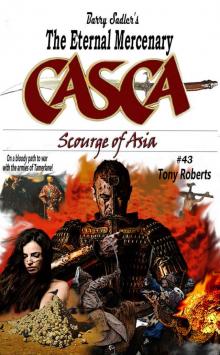 Casca 43: Scourge of Asia
Casca 43: Scourge of Asia The Lombard
The Lombard Casca 49: The Lombard
Casca 49: The Lombard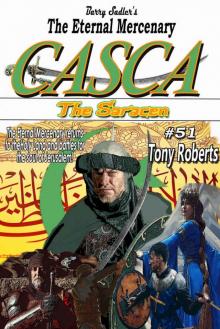 The Saracen
The Saracen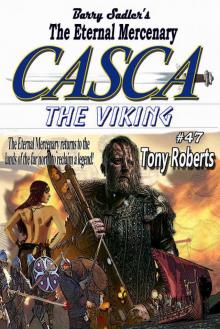 Casca 47: The Viking
Casca 47: The Viking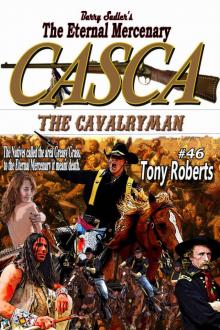 Casca 46: The Cavalryman
Casca 46: The Cavalryman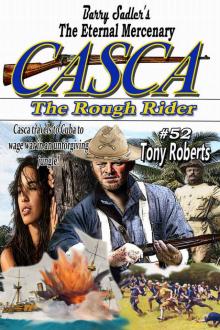 Casca 52- the Rough Rider
Casca 52- the Rough Rider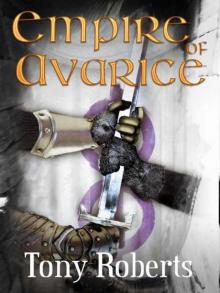 Empire of Avarice
Empire of Avarice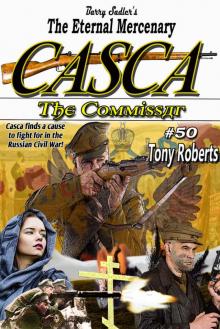 The Commissar
The Commissar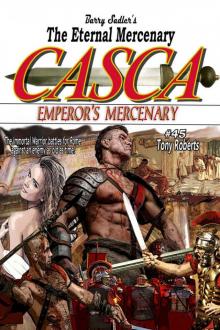 Casca 45: Emperor's Mercenary
Casca 45: Emperor's Mercenary Dark Blade
Dark Blade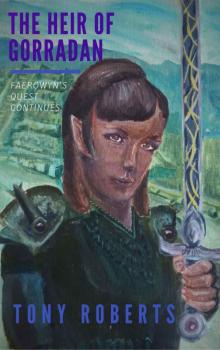 The Heir of Gorradan (Chronicles of Faerowyn Book 2)
The Heir of Gorradan (Chronicles of Faerowyn Book 2)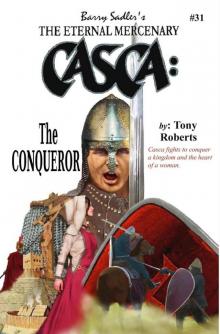 Casca 31: The Conqueror
Casca 31: The Conqueror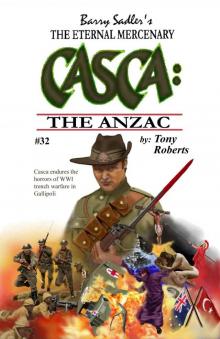 Casca 32: The Anzac
Casca 32: The Anzac The Anzac
The Anzac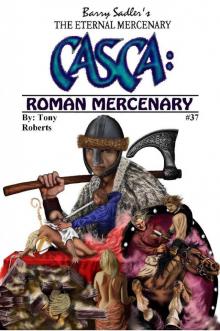 Casca 37: Roman Mercenary
Casca 37: Roman Mercenary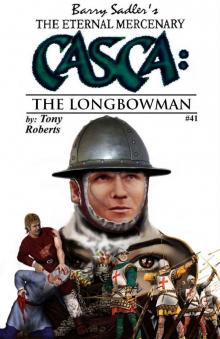 Casca 41: The Longbowman
Casca 41: The Longbowman The Longbowman
The Longbowman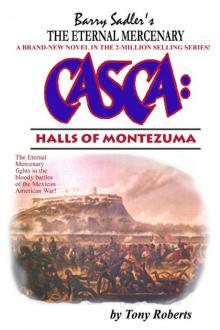 Casca 25: Halls of Montezuma
Casca 25: Halls of Montezuma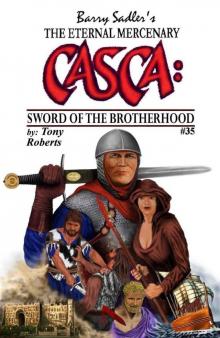 Sword of the Brotherhood
Sword of the Brotherhood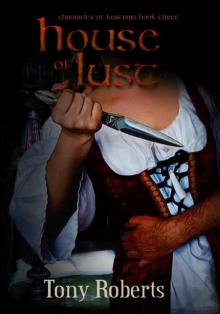 House of Lust
House of Lust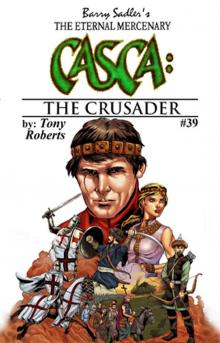 Casca 39 The Crusader
Casca 39 The Crusader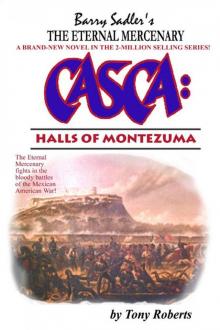 Halls of Montezuma
Halls of Montezuma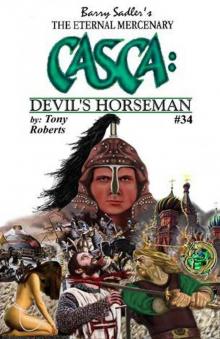 Devil's Horseman
Devil's Horseman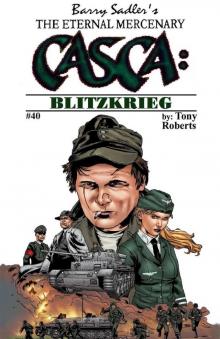 Casca 40: Blitzkrieg
Casca 40: Blitzkrieg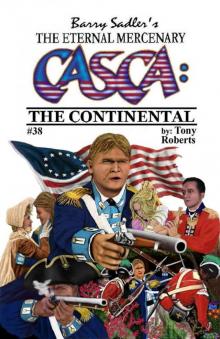 Casca 38: The Continental
Casca 38: The Continental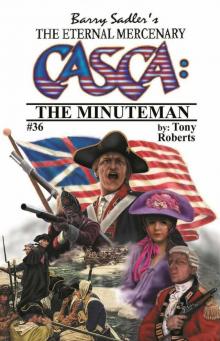 The Minuteman
The Minuteman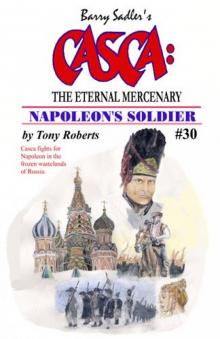 Napoleon's Soldier
Napoleon's Soldier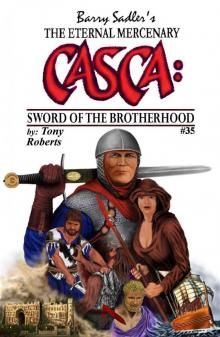 Casca 35: Sword of the Brotherhood
Casca 35: Sword of the Brotherhood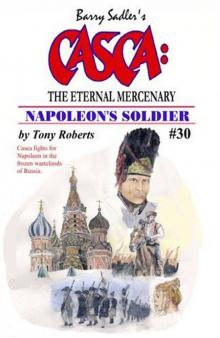 Casca 30: Napoleon's Soldier
Casca 30: Napoleon's Soldier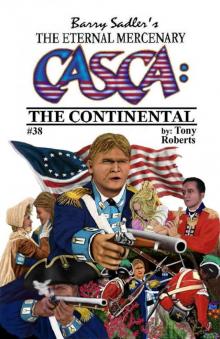 The Continental
The Continental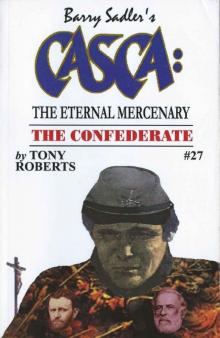 The Confederate
The Confederate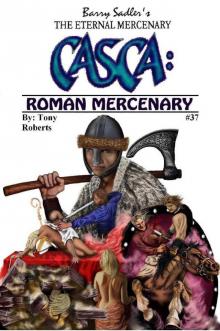 Roman Mercenary
Roman Mercenary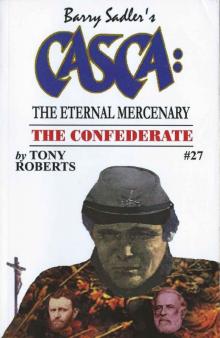 Casca 27: The Confederate
Casca 27: The Confederate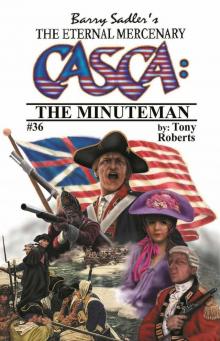 Casca 36: The Minuteman
Casca 36: The Minuteman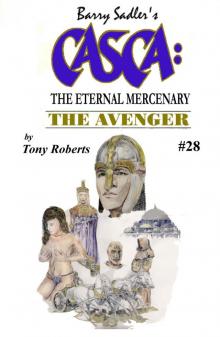 Casca 28: The Avenger
Casca 28: The Avenger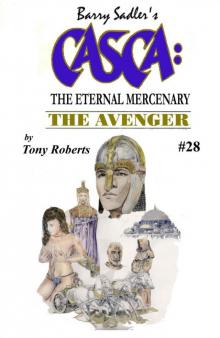 The Avenger
The Avenger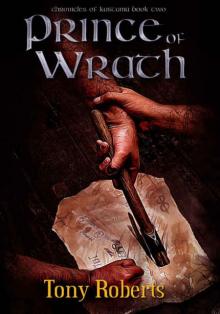 Prince of Wrath
Prince of Wrath